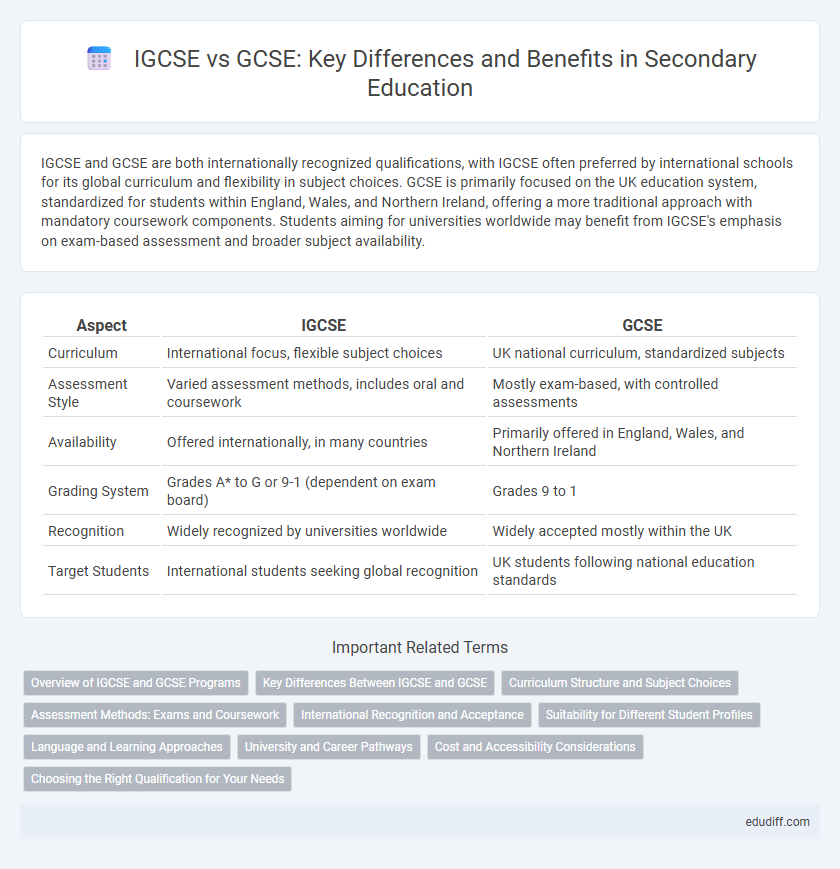IGCSE and GCSE are both internationally recognized qualifications, with IGCSE often preferred by international schools for its global curriculum and flexibility in subject choices. GCSE is primarily focused on the UK education system, standardized for students within England, Wales, and Northern Ireland, offering a more traditional approach with mandatory coursework components. Students aiming for universities worldwide may benefit from IGCSE's emphasis on exam-based assessment and broader subject availability.
Table of Comparison
| Aspect | IGCSE | GCSE |
|---|---|---|
| Curriculum | International focus, flexible subject choices | UK national curriculum, standardized subjects |
| Assessment Style | Varied assessment methods, includes oral and coursework | Mostly exam-based, with controlled assessments |
| Availability | Offered internationally, in many countries | Primarily offered in England, Wales, and Northern Ireland |
| Grading System | Grades A* to G or 9-1 (dependent on exam board) | Grades 9 to 1 |
| Recognition | Widely recognized by universities worldwide | Widely accepted mostly within the UK |
| Target Students | International students seeking global recognition | UK students following national education standards |
Overview of IGCSE and GCSE Programs
IGCSE and GCSE programs both provide internationally recognized secondary education qualifications, with IGCSE offering a more globally flexible curriculum tailored to diverse educational systems. GCSE programs are predominantly UK-based, emphasizing a standardized assessment structure aligned with UK national standards. Both curricula assess core subjects, preparing students for advanced studies such as A-levels or equivalent qualifications worldwide.
Key Differences Between IGCSE and GCSE
IGCSE courses offer a broader international perspective and flexible assessment options, making them ideal for students in diverse educational settings. GCSE exams are primarily UK-based with a standardized curriculum emphasizing core subjects and formal examination methods. IGCSE allows for a wider choice of subjects and assessment styles, providing adaptability to different learning environments compared to the more centralized approach of GCSE.
Curriculum Structure and Subject Choices
IGCSE and GCSE curricula differ significantly in structure, with IGCSE offering a more flexible and international syllabus designed to accommodate a wide range of educational systems. Subject choices in IGCSE tend to be broader, including diverse options like Accounting, Business Studies, and Foreign Languages, allowing students to tailor their education to global standards. In contrast, GCSE follows a more standardized UK-centric curriculum with a fixed set of core subjects such as English, Mathematics, and Science, limiting elective diversity.
Assessment Methods: Exams and Coursework
IGCSE assessment methods primarily emphasize final exams, with limited coursework components, allowing for standardized evaluation across international centers. In contrast, GCSE incorporates a mix of exams and significant coursework or controlled assessments, promoting continuous evaluation of student skills. This distinction affects teaching strategies and student preparation, with IGCSE favoring exam-focused study and GCSE encouraging practical application through coursework.
International Recognition and Acceptance
IGCSE qualifications hold broader international recognition compared to GCSE, making them highly preferred by universities and employers worldwide, especially in countries outside the UK. The IGCSE curriculum is designed to cater to a global student base, offering more flexible and diverse subject options which enhance acceptance across various education systems. GCSEs, while widely recognized within the UK, may face limitations in global recognition and acceptance, particularly in regions where the IGCSE is the standard benchmark.
Suitability for Different Student Profiles
IGCSE offers greater flexibility and is ideal for international students or those seeking a curriculum with a global perspective, while GCSE better suits students aiming for study primarily within the UK education system. IGCSE courses tend to emphasize application and understanding, benefiting learners who prefer practical and analytical approaches, whereas GCSE provides a structured framework aligned with specific UK assessment standards. Choosing between IGCSE and GCSE should consider student learning styles, future academic goals, and geographic context to maximize educational outcomes.
Language and Learning Approaches
IGCSE and GCSE language curricula emphasize critical language skills, but IGCSE often incorporates a more global perspective, enhancing cross-cultural communication and analytical reading. IGCSE assessments rely heavily on coursework and oral examinations, promoting continuous learning and practical language application, whereas GCSE typically focuses on final exams that test memorization and formal writing. Learning approaches in IGCSE foster independent thinking and inquiry-based tasks, which align with international standards, contrasting with GCSE's more traditional, structured syllabus.
University and Career Pathways
IGCSE qualifications are recognized internationally by universities and employers, often providing students with a broader curriculum that enhances critical thinking and independent learning skills. GCSEs, while primarily UK-focused, are widely accepted by British universities and employers, ensuring strong preparation for domestic career pathways. Both IGCSE and GCSE results significantly influence university admissions and can determine eligibility for advanced courses or vocational training programs.
Cost and Accessibility Considerations
IGCSE courses often have higher examination fees compared to GCSEs, which can impact overall affordability for students and schools. Accessibility varies as IGCSEs are widely available internationally, offering flexibility for overseas learners, while GCSEs are primarily UK-based with more accessible local testing centers. Schools must assess budget constraints and student needs when choosing between the two qualifications.
Choosing the Right Qualification for Your Needs
Selecting between IGCSE and GCSE depends largely on your educational goals and learning style. IGCSE offers international recognition and a diverse range of subjects, ideal for students aiming for global universities. GCSE provides a structured curriculum tailored to the UK education system, beneficial for those planning to study or work within the UK.
IGCSE vs GCSE Infographic

 edudiff.com
edudiff.com